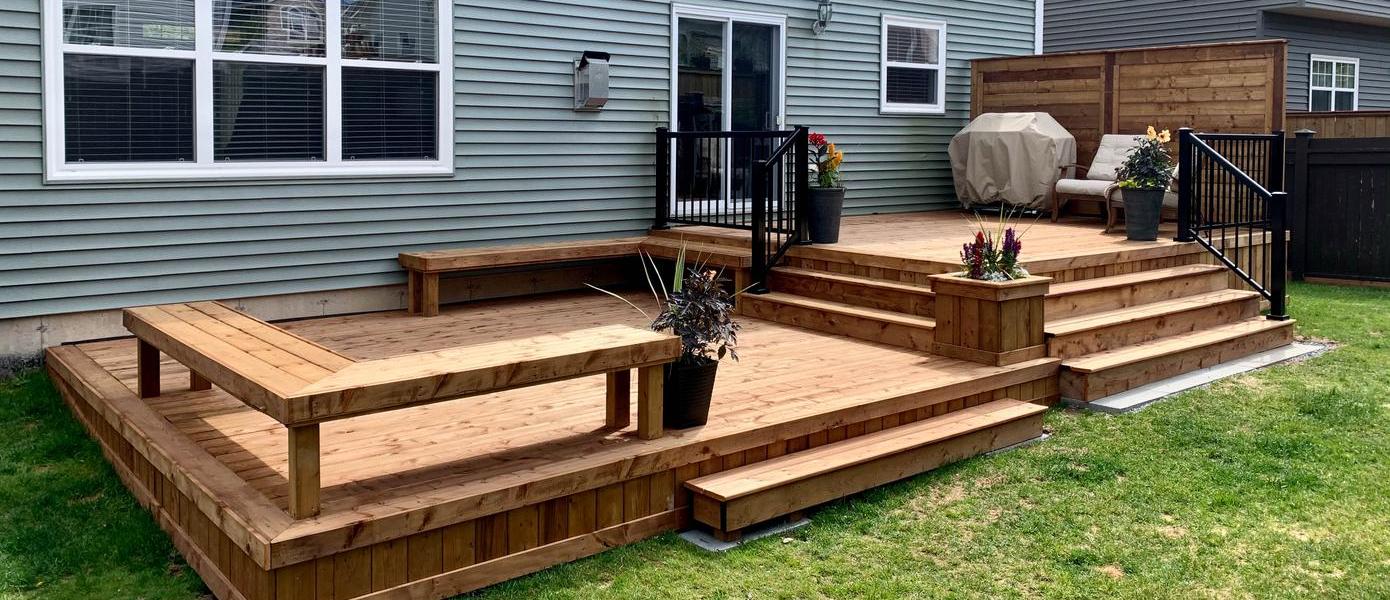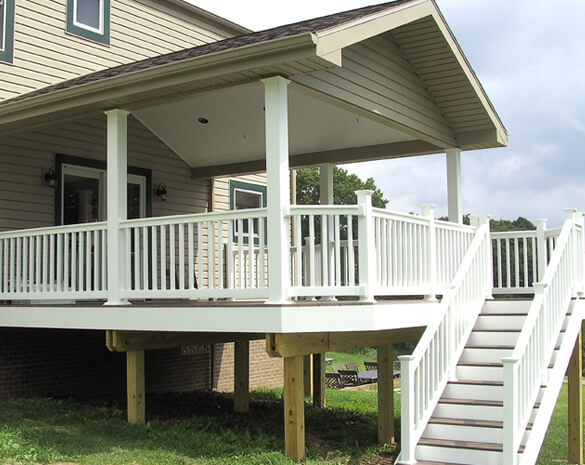Top 10 Tools Recommended by Wood Deck Builders Contractors Near Me for DIY Enthusiasts
A Step-by-Step Method to Effective Deck Installment for Home Owners
When it comes to setting up a deck, careful planning is vital. Beginning by examining your area and setting clear objectives. Recognizing just how to create your deck design can make all the distinction in maximizing your outdoor location.
Examining Your Area and Setting Objectives
How do you picture your optimal deck? Take dimensions to comprehend how much room you've obtained to work with. Think about just how you want to utilize the deck: will it be a comfy hideaway, a gathering place for close friends, or an area for family members meals?
Next, set specific objectives. Do you intend to incorporate seats, a grill, or probably planters? Imagine the flow of motion and confirm it enhances your home's design. Prioritize functionality, yet don't fail to remember aesthetics. Produce a list of must-haves and nice-to-haves. This clarity will lead your choices and enhance the preparation procedure. By reviewing your area and establishing clear objectives, you'll lay the foundation for a deck that fulfills your demands perfectly.
Picking the Right Products
With your objectives and area described, it's time to select the best materials for your deck. First, think about the environment in your location. If you stay in an area with hefty rain or humidity, opt for materials resistant to moisture, like composite outdoor decking or pressure-treated timber. If you like a natural look, hardwoods like cedar and redwood provide appeal and durability but might call for even more upkeep.
Next, think of your budget plan. Composite materials can be costlier upfront yet often last longer and need less maintenance. If you get on a tighter budget plan, treated lumber is inexpensive and widely readily available, yet it may call for routine maintenance.
Finally, do not ignore looks. Choose colors and appearances that match your home and landscape. By meticulously choosing your products based on these elements, you'll assure your deck not only fulfills your needs yet likewise enhances your outside space.
Designing Your Deck Design
Creating a well-balanced deck layout is crucial for making best use of both capability and pleasure. Begin by thinking about just how you prepare to make use of the room.
Procedure your lawn to assure your deck fits harmoniously within the landscape. Believe about flow and accessibility; it's vital to create pathways that make activity very easy. If you're including furnishings, sketch a layout that accommodates seats, tables, and any kind of added functions like planters or a fire pit.
Likewise, think about the sun and color patterns throughout the day. Placing your deck to catch sunlight during cooler months can enhance its use. Lastly, don't forget concerning personal privacy-- integrating screens or landscape design can help create an extra intimate setup. With mindful preparation, your deck layout will certainly not just serve your demands however also boost your exterior experience.
Obtaining Needed Permits
Prior to you begin developing your deck, it is very important to examine local laws and obtain the necessary licenses. Each location has particular regulations regulating deck construction, consisting of size, elevation, and products - composite deck builders austin tx near me. Begin by seeing your regional structure department or their web site to gather info on what's called for
You'll likely need to complete a permit application and provide in-depth prepare for your deck, consisting of measurements and products. Do not fail to remember to check if any type of zoning regulations or homeowner association standards apply to your residential or commercial property, as they may impose extra constraints.
Once you submit your application, the evaluation procedure can take time, so plan in advance. If your project does not meet regional codes, you may need to modify your strategies, which can postpone your installation. By protecting the required authorizations initially, you guarantee that your deck project stays on track and follow all laws.
Preparing the Ground and Structure
Preparing the ground and structure for your deck is crucial for ensuring security and long life. Begin by selecting the right place-- preferably, a level location that drains pipes well. Clear the site of any type of debris, greenery, or rocks. Next, mark the summary of your deck making use of stakes and string to envision the area.
Once you've specified the location, dig down to remove the topsoil, reaching a deepness of regarding 6 inches. This assists prevent moisture build-up and rot. If you're utilizing concrete footings, dig holes where your blog posts will certainly go, a minimum of 12 inches deep to get to secure soil.
Consider including gravel to the bottom of these openings for water drainage. Condense the soil to develop a strong base, and look for degree with a lengthy board or level device. By taking these actions, you'll set a strong structure that sustains your deck for years ahead.
Developing the Deck Structure

This structure is vital for the resilience of your deck, so take your time and verify each element is effectively set up. With your deck structure constructed, you're one action closer to appreciating your new outdoor sanctuary!
Adding Ending Up Touches and Upkeep Tips
Now that your deck is constructed, it's time to focus on the finishing touches and upkeep. Choosing the appropriate discolor can boost its appearance, while routine cleansing keeps it looking fresh. Do not forget to adhere to a seasonal maintenance list to guarantee your deck remains in excellent shape year-round.
Picking Deck Staining Options
Just how do you choose the ideal stain for your deck? Beginning by assessing the kind of wood. Various woods soak up stains differently, so inspect compatibility. Next off, consider the surface you desire. Transparent discolorations showcase the timber's all-natural charm, while semi-transparent alternatives add shade without entirely hiding the grain. Strong stains supply maximum insurance coverage, ideal for used or aged timber.

Routine Cleansing Methods

Seasonal Maintenance List
A properly maintained deck can transform your outside space into a magnificent retreat, so it's crucial to comply with a seasonal upkeep list. Start each springtime by inspecting for any type of damages, such as loose boards or rusting fasteners.
In summer season, check for mold and mildew or mold and address it without delay. Keep the deck without mess and look for signs of wear.
As autumn methods, clear fallen leaves and particles to prevent moisture accumulation. Tighten up any kind of loosened screws.
Finally, during winter months, validate that snow and ice are gotten rid of to stop structural damage. Normal focus to these tasks keeps your deck looking excellent year-round!
Frequently Asked Concerns
For how long Does a Normal Deck Installation Take?
A typical deck installment can take anywhere from a few days to a pair of weeks, relying on size, materials, and climate. You'll wish to intend as necessary to assure every little thing goes smoothly and efficiently.
Can I Mount a Deck on Irregular Ground?
Yes, you can set up a deck on uneven ground. You'll require to level the location, usage adjustable post sustains, or think about building a multi-level deck to accommodate the incline and assurance stability.
What Devices Do I Need for Deck Installment?
You'll require a few essential devices for deck setup: a tape procedure, level, saw, drill, hammer, and screws. Do not fail to remember safety equipment like gloves and safety glasses to keep on your Visit Your URL own safeguarded while working.
Just how Do I Guarantee My Deck Is Safe and Sturdy?
To guarantee your deck's risk-free and sturdy, routinely examine for loose boards, secure barriers, and correct assistance. Use top quality products, adhere to building regulations, and think about professional assessments to maintain its honesty in time.
What Prevail Mistakes to Prevent During Installation?
When setting up a deck, stay clear of common mistakes like incorrect dimensions, disregarding authorizations, using low-quality products, or missing the progressing procedure. These oversights can compromise safety and longevity, so take note of detail throughout the project.